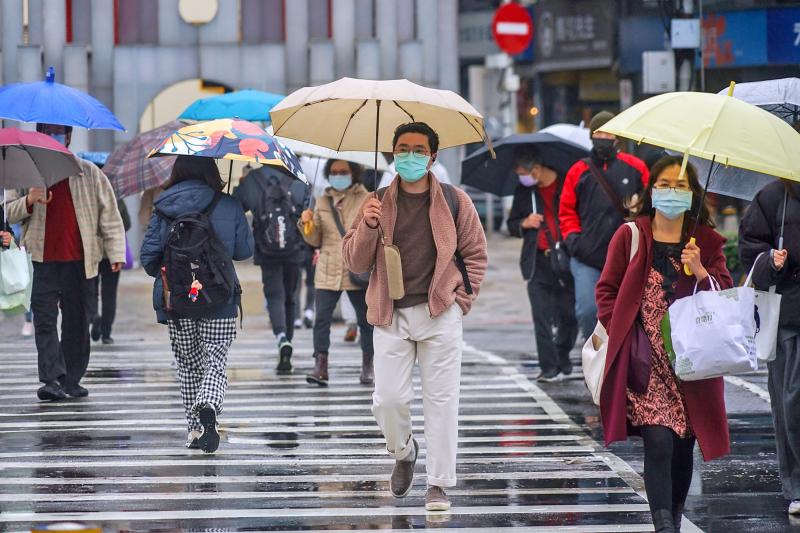Taiwanese this month turned less confident about the nation’s economic outlook, stock investments and the purchase of big-ticket items as COVID-19 outbreaks linger and geopolitical tensions escalate, a survey by Cathay Financial Holding Co (國泰金控) showed yesterday.
The monthly survey found that 36 percent of respondents had an optimistic outlook about the nation’s economy in the coming six months, while 33.3 percent believed the economy would deteriorate.
The narrowing gap between the optimists and pessimists came as intensifying military tensions between Russia and Ukraine jolt global markets and deepen inflation concerns, Taiwan’s largest financial service provider by capitalization said.

Photo: CNA
Russia is the world’s third-largest oil producer with an output of more than 11 million barrels per day and the threat of a military conflict with Ukraine has pushed up crude oil prices.
The poll showed that 85.4 percent of respondents believe consumer prices would climb higher, while 92.9 percent said prices have already increased from six months ago.
Nearly 76 percent expect prices of daily necessities to rise at least 6 percent, the survey said after polling 19,523 people online from Feb. 1 to 7.
About 34 percent believe that finding a job would become more difficult in the coming six months, compared with 21.4 percent who expect an improvement in the job market, the survey said.
Only 24 percent of respondents expect an increase in their income, even though the government and a considerable number of companies have announced pay hikes, it said.
Thirty-two percent said they would cut back on purchases of durable goods and 26.9 percent voiced plans to reduce consumption of big-ticket items, the survey found.
About 45 percent said there be would no change either way.
A slight majority, or 50.2 percent, said they would stay put with their investment portfolios, while 32.1 percent intend to increase stakes in local firms and 17.7 percent plan to reduce positions, the survey showed.
The latest figures represent a noticeable retreat in risk appetite from last month, which likely has to do with corrections in global technology shares ahead of expected monetary tightening by major central banks, Cathay Financial said.
The US Federal Reserve has signaled plans to raise interest rates next month at the earliest to curb inflation. Peers elsewhere might follow suit for similar reasons.
About 30 percent of respondents said the TAIEX would trade between 17,000 and 18,500 points in the first half of this year.

Macronix International Co (旺宏), the world’s biggest NOR flash memory supplier, yesterday said it would spend NT$22 billion (US$699.1 million) on capacity expansion this year to increase its production of mid-to-low-density memory chips as the world’s major memorychip suppliers are phasing out the market. The company said its planned capital expenditures are about 11 times higher than the NT$1.8 billion it spent on new facilities and equipment last year. A majority of this year’s outlay would be allocated to step up capacity of multi-level cell (MLC) NAND flash memory chips, which are used in embedded multimedia cards (eMMC), a managed

CULPRITS: Factors that affected the slip included falling global crude oil prices, wait-and-see consumer attitudes due to US tariffs and a different Lunar New Year holiday schedule Taiwan’s retail sales ended a nine-year growth streak last year, slipping 0.2 percent from a year earlier as uncertainty over US tariff policies affected demand for durable goods, data released on Friday by the Ministry of Economic Affairs showed. Last year’s retail sales totaled NT$4.84 trillion (US$153.27 billion), down about NT$9.5 billion, or 0.2 percent, from 2024. Despite the decline, the figure was still the second-highest annual sales total on record. Ministry statistics department deputy head Chen Yu-fang (陳玉芳) said sales of cars, motorcycles and related products, which accounted for 17.4 percent of total retail rales last year, fell NT$68.1 billion, or

In the wake of strong global demand for AI applications, Taiwan’s export-oriented economy accelerated with the composite index of economic indicators flashing the first “red” light in December for one year, indicating the economy is in booming mode, the National Development Council (NDC) said yesterday. Moreover, the index of leading indicators, which gauges the potential state of the economy over the next six months, also moved higher in December amid growing optimism over the outlook, the NDC said. In December, the index of economic indicators rose one point from a month earlier to 38, at the lower end of the “red” light.

MediaTek Inc (聯發科) shares yesterday notched their best two-day rally on record, as investors flock to the Taiwanese chip designer on excitement over its tie-up with Google. The Taipei-listed stock jumped 8.59 percent, capping a two-session surge of 19 percent and closing at a fresh all-time high of NT$1,770. That extended a two-month rally on growing awareness of MediaTek’s work on Google’s tensor processing units (TPUs), which are chips used in artificial intelligence (AI) applications. It also highlights how fund managers faced with single-stock limits on their holding of market titan Taiwan Semiconductor Manufacturing Co (TSMC, 台積電) are diversifying into other AI-related firms.